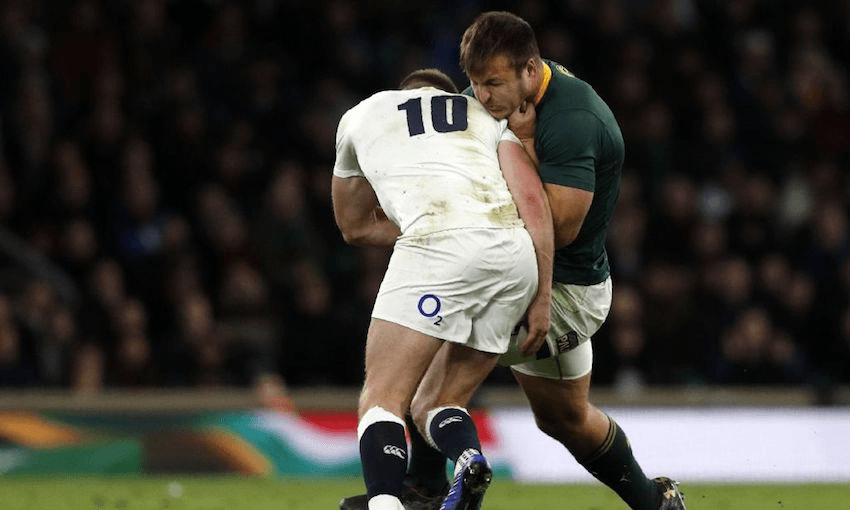Regardless on where you stand on the Owen Farrell Incident, the last 72 hours demonstrate one thing: rugby union revels in confusing its own fans.
“Almost everyone believes that should have been a penalty.”
This is as close as one can get to the definitive word from World Rugby when it comes to that Owen Farrell tackle on Andre Esterhuizen on Saturday at Twickenham. I say as close to because that is a direct quote from a top ranking official who I have chosen not to name because, well, it seems top ranking officials aren’t supposed to discuss these matters.
Well, that’s not entirely true. They can occasionally discuss these things, like when Craig Joubert made a late penalty call against Scotland in the Rugby World Cup which scuppered their semifinal hopes, and the decision was deemed incorrect after the fact. Or like in 2009 when Paddy O’Brien skewered Stuart Dickinson’s refereeing after the All Blacks-Italy scrum fest at the San Siro. Or when World Rugby announced that Glenn Newman had made an error in his decision not to award Wales a try in this year’s Six Nations.
Yet here we are, in the middle of the next week, three days after the fact, and still the debate rages. Was it a legal tackle? Did he try to wrap his arms? Did he make contact with the head? Was it so different to Danny Cipriani’s red card tackle? Can a citing commissioner act independently of the on-field decision? Can he upgrade that decision? Was the on-field decision deemed accurate in the first place? And on and on and on…
Why is that referees spend 80 minutes a game talking and then fall silent when fans and players and coaches are most desperate for clarity?
It is clarity that is required here, not for any assuaging of jingoistic pride, either. It is not World Rugby’s place to take sides. It is, however, the organisation’s duty to provide consistent application of the laws of the game and to show respect for those who love the game. It is not enough to sit back and let this argument dominate the build up to the most anticipated test match of the year. Some within the organisation may claim that this is all grist for the marketing mill, but it’s not. It’s just wrong.
Angus Gardner is a very good referee by any objective (a keyword to consider) evaluation. He is also a man blessed with enough emotional intelligence to understand he won’t get every decision right. It is likely that, privately, Gardner would have reviewed that game and decided that the tackle should have been penalised. An admission of that would be cold comfort for the Springboks and their fans, but a mea culpa would be both refreshingly open and, one would like to think, appreciated by fans of the game the world over.
This is not a call for referees to explain every decision they make, or do not make, on a rugby field. There are, however, some calls that demand context – big calls in huge games that have massive implications not just for the result, but for the very sport itself. Those calls need to be discussed with fans by officials, and by the custodians of the sport’s integrity. Because, that’s, ya know, like, what adults do.
Nothing will change the fact that England won a test against South Africa 12-11 last Saturday. It’s in the books, on the score sheet, official. And the Springboks should not, and will not, be thinking they lost the game because of one late call. They lost the game mainly because they bottled it. Rassie Erasmus’s tongue-in-cheek tackle practice video is evidence enough that he knows this brouhaha masks the true nature of that performance. South Africa weren’t as good as they could have been. England, for their part, were incredibly brave.
It is that bravery that should be celebrated, and that bravery that should remind us all that this ongoing silence is very weak indeed.
This story originally ran on RugbyPass.com – the premier destination for rugby fans in Asia, streaming International Test Matches including The Rugby Championship, Super Rugby and more to your device wherever you are in Asia.

